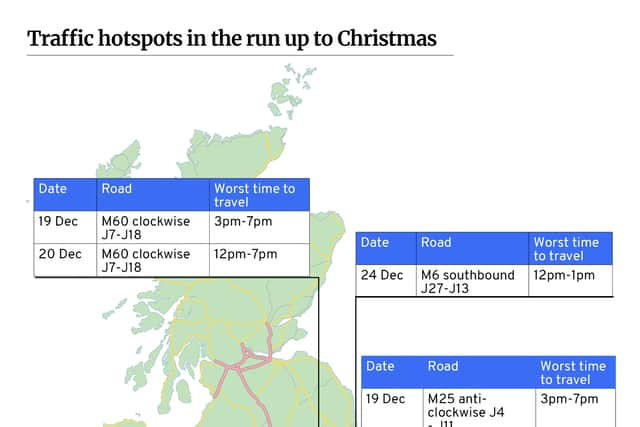Christmas traffic 2022: busiest roads and travel times for Xmas and New Year period amid UK rail strikes
and live on Freeview channel 276
Drivers have been warned to expect “jams today, jams tomorrow” as traffic levels ramp up on the approach to Christmas.
Travel experts are predicting major delays and disruption on key roads including the M6, M25 and M40 as drivers try to cram millions of extra journeys into the end of the week and strikes on the railways force even more people onto the roads.
Advertisement
Advertisement
Traffic volumes are expected to increase gradually throughout the week, reaching “frantic” levels on Friday 23 December as four million additional car trips are taken by people heading to visit friends and family or do last-minute shopping.
Traffic analysts INRIX expect around 40% of all festive journeys to be crammed into Friday and Saturday, with another four million trips predicted on Christmas Eve and heavy traffic expected from mid-morning until around 7pm.


Traffic on Christmas Eve will be made worse by rail strikes due to start at 6pm. Rail passengers are being warned to complete their journeys earlier in the day and many people are expected to drive rather than risk delays or cancellations on the trains.
In total, drivers are set to make an estimated 19.6m separate trips by car between Monday 19 and Monday 26 December, with journey times expected to be around 14% longer than the same time last year as traffic returns to pre-pandemic levels.
Advertisement
Advertisement
The worst affected routes are predicted to be around major cities and on stretches of the M25, M60 near Manchester, M6 in the north-west and M40 in Oxfordshire. The AA is warning of particular choke points where the M25 meets the M3, M4, M1, M11, M20 and A1(M). Delays are also expected on the M6 around Birmingham and at the interchange with the A69, M62/M60 junctions around Manchester, the A64 between Leeds and York and the M8 near Edinburgh. The M4/M5 interchange at Bristol and M5 at Exeter are also likely to experience heavy congestion.
The RAC is advising motorists to plan ahead, allow more time for their journeys and ensure their car is in good condition. RAC breakdown spokesman Rod Dennis said: “Our research suggests getaway traffic will build steadily all week, culminating in two frantic days of travelling just before Christmas itself. By Friday, we fear it will be a case of ‘jams today and jams tomorrow’ on the roads as millions of people jump behind the wheel to see family and friends – with last-minute Christmas shoppers as well as the impact of another rail strike also leading to an increase in traffic. If possible, drivers should try to make their trips on a quieter day earlier this week if they possibly can.
“One saving grace for drivers might be that much of the country will see milder weather conditions this week with a much smaller chance of snow and ice like we saw just a week ago.”
Jack Cousens, head of roads policy for the AA, added: “The rail strikes have convinced more people to travel by car this year, and while hundreds of miles of roadworks have been removed to ease the pain, it might not be enough to keep the queues away.
Advertisement
Advertisement
“Breakdowns add to traffic jams, so if everyone spent 10 minutes checking their car before leaving it could save everyone hours on their journey. As well as preparing your car you need to prepare yourself. Carrying warm clothing, water and snacks as well as entertainment for younger travellers in a must.”
While Friday and Saturday are set to be the busiest days on the road, INRIX is predicting families will make around 3.6m extra journeys on Christmas Day and 3.3m on Boxing Day, although a lack of commuter traffic should mean less congestion and fewer delays.
INRIX transportation analyst Bob Pishue said: “With pre-pandemic levels of travellers hitting the road this holiday, drivers must be prepared for delays – especially in and around major cities. Our data shows, and our advice is, to avoid travelling during peak commuting hours this week. If schedules allow, leave bright and early or following the end of the afternoon commute.”
